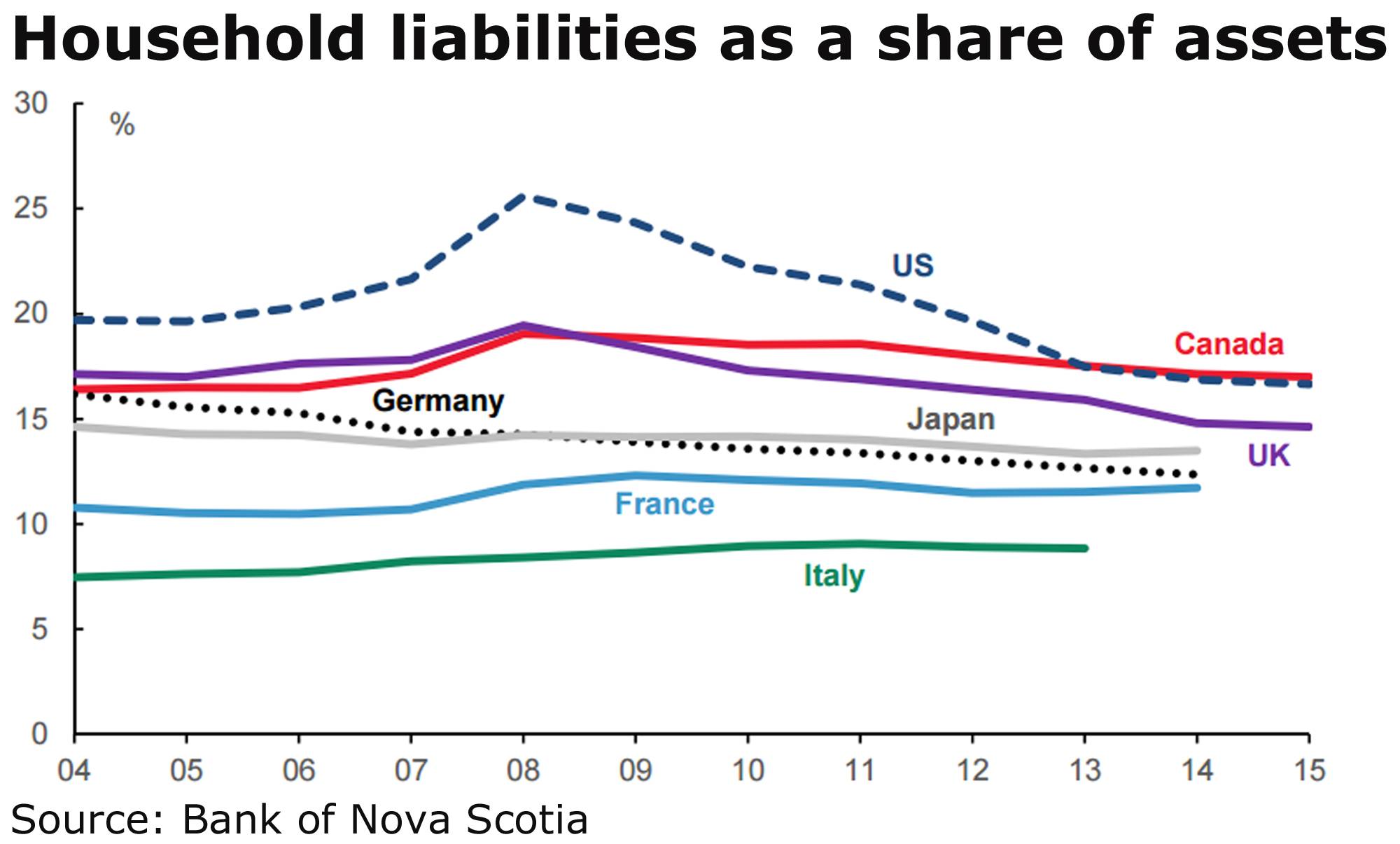Briefing highlights
- Moody's downgrades Canadian banks
- Rating agency cites debt, home prices
- Beaudoin steps down from executive role
- More deposit draws at Home Capital
- Air Canada to launch loyalty program
- Aimia stock tanks
- Magna profit tops estimates
- Telus profit up on wireless
- Canadian Tire results beat estimates
Moody's downgrades banks
Moody’s Investors Service is downgrading Canada’s major banks, warning of frothy house prices and swelling levels of business and consumer debt.
The big credit rating agency’s action late Wednesday affects Toronto-Dominion Bank, Bank of Montreal, Bank of Nova Scotia, Canadian Imperial Bank of Commerce, Royal Bank of Canada and National Bank of Canada, as well as some affiliates.
Baseline credit assessment, deposit and long-term debt ratings were trimmed by one notch. Those on counterparty risk assessments were also affected, with the exception of TD.
Baseline credit assessments look at the strength of a company absent a government support measure such as a bailout.
The move initially hit the Canadian dollar, though stronger crude prices brought the currency back.
Canada’s banks are deemed among the soundest in the world, though for years now observers have warned about record household debt and inflated housing markets that have prompted the federal, B.C. and Ontario governments to act. Analysts do not expect any U.S.-style crash, but rather a slowing of the market.
This latest warning from Moody’s also comes amid the turmoil at Home Capital Inc., an alternative lender whose troubles have raised further concerns over mortgage financing and housing in Canada, despite its tiny portion of the market.

“Today’s downgrade of the Canadian banks reflects our ongoing concerns that expanding levels of private-sector debt could weaken asset quality in the future,” Moody’s senior vice-president David Beattie said in announcing the decision.
“Continued growth in Canadian consumer debt and elevated housing prices leaves consumers, and Canadian banks, more vulnerable to downside risks facing the Canadian economy than in the past.”
It’s not only household debt that’s troubling Moody’s, though that’s the primary issue.
The ratio of private-sector debt to gross domestic product swelled to 185 per cent at the end of last year, compared to 179.3 per cent a year earlier, the agency said, also citing the rapid rise in business credit.

As for households, the latest reading put consumer debt at a record 167.3 per cent of disposable income.
This all accounts for “increasing risk” to bank profitability and asset quality,” Moody’s said.
“Despite macro-prudential measures put into place by Canadian policy makers in recent years - which have had some success in moderating the rate of housing price growth - house prices and consumer debt levels remain historically high,” the agency said.
“We do note that the Canadian banks maintain strong buffers in terms of capital and liquidity,” it added.
“However, the resilience of household balance sheets, and consequently bank portfolios, to a serious economic economic downturn has not been tested at these levels of private sector indebtedness.”
The banks did not comment.
The shot across the bow by Moody’s is the latest in a series of warnings from economists, agencies, the central bank and the Bank for International Settlements, which has warned of the mounting threat of a financial crisis in Canada.
The Bank of Canada, for its part, has cited the rise in certain regions of high-ratio mortgages, or those with a marked loan-to-income measure.
The Moody’s downgrade rippled through currency markets, knocking the Canadian, Australian and New Zealand dollars.
The loonie traded as low as 72.63 cents (U.S.) and as high as 73.23 cents.
The latter were affected because “markets extrapolated the implications to structurally similar bank sectors in Australia and N.Z.,” said Adam Cole, RBC’s chief currency strategist in London.
“As usual, we we would caution against overreacting to the rating agency’s actions, which largely reflect factors already widely known and discounted,” he said, adding that rising oil prices buoyed the currencies after the initial reaction.
Derek Holt, Scotiabank’s head of capital markets economics, said he found the timing of the downgrade curious, given the steps being taken to “stabilize” Home Capital, and given how small the company is.
“Second, we’ve heard ratings agencies warning about Canadian housing and debt in Canada for years and years after having reacted after the fact to the U.S. crisis,” Mr. Holt said.
“Moody’s downgraded the Canadian banks in January, 2013, with very similar logic, and yet more than four years later the sky has not fallen on housing, the consumer or banks,” he added.
The move on Wednesday lowered TD’s rating to Aa2, while the other big banks’ fell to A1.
“I’m not sure how much new information is contained within this latest salvo but it certainly plays to market sentiment.”
Beaudoin steps down
Pierre Beaudoin is stepping down as Bombardier Inc.’s executive chairman amid a mounting controversy over executive pay at the Canadian plane and train maker.
Mr. Beaudoin will become non-executive chairman, the company said Thursday in advance of its annual meeting after a revolt by several Canadian institutional investors.
The move means Mr. Beaudoin will still chair the board, but will no longer have any management role at Bombardier, a company spokesman said.
This came as Bombardier also reported first-quarter results, a net loss of $31-million or 2 cents a share.
Want to interact with other informed Canadians and Globe journalists? Join our exclusive Globe and Mail subscribers Facebook group